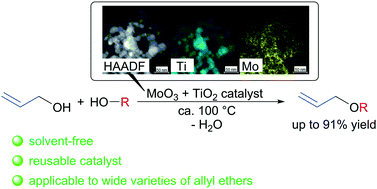当前位置:
X-MOL 学术
›
Catal. Sci. Technol.
›
论文详情
Our official English website, www.x-mol.net, welcomes your feedback! (Note: you will need to create a separate account there.)
Versatile etherification of alcohols with allyl alcohol by a titanium oxide-supported molybdenum oxide catalyst: gradual generation from titanium oxide and molybdenum oxide†
Catalysis Science & Technology ( IF 5 ) Pub Date : 2018-07-20 00:00:00 , DOI: 10.1039/c8cy00613j Yoshihiro Kon 1, 2, 3, 4 , Tadahiro Fujitani 1, 2, 3, 4 , Takuya Nakashima 1, 2, 3, 4 , Toru Murayama 4, 5, 6, 7, 8 , Wataru Ueda 4, 5, 6, 7, 9
Catalysis Science & Technology ( IF 5 ) Pub Date : 2018-07-20 00:00:00 , DOI: 10.1039/c8cy00613j Yoshihiro Kon 1, 2, 3, 4 , Tadahiro Fujitani 1, 2, 3, 4 , Takuya Nakashima 1, 2, 3, 4 , Toru Murayama 4, 5, 6, 7, 8 , Wataru Ueda 4, 5, 6, 7, 9
Affiliation

|
Etherification using allyl alcohol to produce allyl ether via dehydration is a fundamental technique for producing fine chemicals that can be applied to electronic devices. We demonstrate a sustainable method to synthesize allyl ethers from allyl alcohol with various alcohols up to a 91% yield, with water as the sole by-product. In this reaction, the active catalyst is gradually generated as the reaction proceeds through the simple mixing of TiO2 and MoO3. The dispersion of MoO3 on the spent catalyst has been observed by XRD, HAADF-STEM, and STEM-EDS mapping. This catalyst shows excellent catalytic activity by virtue of the highly dispersed nature of MoO3 supported on TiO2, which is reusable at least five times. According to a mechanistic study including the measurement of XPS of MoO3 on TiO2 and control experiments using SiO2 and Al2O3 supports, the suitable reducibility of MoO3 to coordinate the allyl moiety on TiO2 seems to be a key factor for high-yielding syntheses of various allyl ethers even under heterogeneous reaction conditions. The reaction mechanism is considered to be as follows: σ-allyl species are formed from dehydration of the allyl alcohol, followed by a nucleophilic attack by another alcohol against the σ-allyl carbon to give allyl ethers. The developed catalytic system should be suitable for easily handled syntheses of allyl ethers due to the employment of commercially available MoO3 and TiO2 with halide- and organic solvent-free reaction conditions.
中文翻译:

氧化钛负载的氧化钼催化剂可将醇与烯丙醇进行全面醚化:由氧化钛和氧化钼逐渐生成†
使用烯丙醇通过脱水进行醚化生产烯丙基醚是生产可用于电子设备的精细化学品的一项基本技术。我们证明了一种可持续的方法,可以从烯丙醇与各种醇类中合成烯丙基醚,最高收率达到91%,其中水是唯一的副产物。在该反应中,通过简单地混合TiO 2和MoO 3,随着反应的进行逐渐生成活性催化剂。通过XRD,HAADF-STEM和STEM-EDS映射已经观察到MoO 3在废催化剂上的分散。该催化剂由于负载在TiO 2上的MoO 3的高度分散性而显示出优异的催化活性。,可重复使用至少五次。根据一项机械研究,包括在TiO 2上测量MoO 3的XPS以及使用SiO 2和Al 2 O 3载体进行的控制实验,MoO 3的适当还原性可协调TiO 2上的烯丙基部分即使在非均相反应条件下,这似乎也是各种烯丙基醚高产率合成的关键因素。认为反应机理如下:烯丙基醇的脱水形成σ-烯丙基物质,然后另一种醇对σ-烯丙基碳进行亲核攻击,得到烯丙基醚。由于使用了无卤和有机溶剂的反应条件,使用了市售的MoO 3和TiO 2,因此开发的催化系统应适合于易处理的烯丙基醚的合成。
更新日期:2018-07-20
中文翻译:

氧化钛负载的氧化钼催化剂可将醇与烯丙醇进行全面醚化:由氧化钛和氧化钼逐渐生成†
使用烯丙醇通过脱水进行醚化生产烯丙基醚是生产可用于电子设备的精细化学品的一项基本技术。我们证明了一种可持续的方法,可以从烯丙醇与各种醇类中合成烯丙基醚,最高收率达到91%,其中水是唯一的副产物。在该反应中,通过简单地混合TiO 2和MoO 3,随着反应的进行逐渐生成活性催化剂。通过XRD,HAADF-STEM和STEM-EDS映射已经观察到MoO 3在废催化剂上的分散。该催化剂由于负载在TiO 2上的MoO 3的高度分散性而显示出优异的催化活性。,可重复使用至少五次。根据一项机械研究,包括在TiO 2上测量MoO 3的XPS以及使用SiO 2和Al 2 O 3载体进行的控制实验,MoO 3的适当还原性可协调TiO 2上的烯丙基部分即使在非均相反应条件下,这似乎也是各种烯丙基醚高产率合成的关键因素。认为反应机理如下:烯丙基醇的脱水形成σ-烯丙基物质,然后另一种醇对σ-烯丙基碳进行亲核攻击,得到烯丙基醚。由于使用了无卤和有机溶剂的反应条件,使用了市售的MoO 3和TiO 2,因此开发的催化系统应适合于易处理的烯丙基醚的合成。


























 京公网安备 11010802027423号
京公网安备 11010802027423号